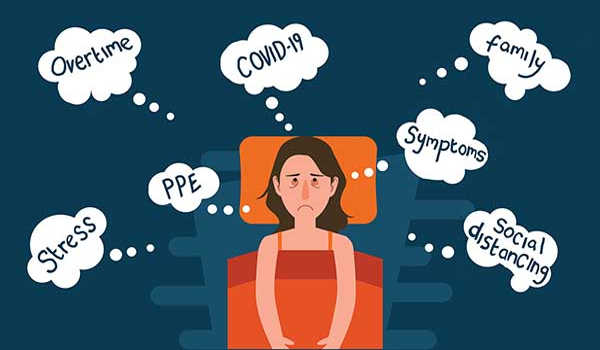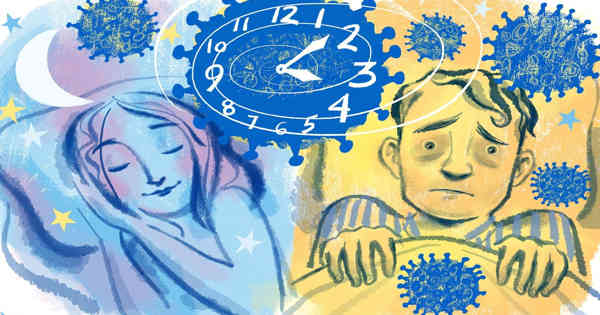According to one study, stress, anxiety, and depression during the first few weeks of the pandemic were linked to less and poorer quality sleep. In a survey of over 900 twins, approximately half reported no change in sleep patterns, while 32.9 percent reported decreased sleep. Another 29.8 percent said they slept more. The researchers discovered that any change in sleep was associated with self-reported mental health issues, though decreased sleep was more strongly associated.
COVID-19 is likely to have caused many people to lose sleep. A study of twins led by Washington State University researchers discovered that stress, anxiety, and depression were associated with less and lower quality sleep during the first few weeks of the pandemic.
In a survey of over 900 twins conducted shortly after the COVID-19 lockdown measures were implemented, roughly half of the respondents reported no change in their sleep patterns, while roughly a third, 32.9 percent, reported decreased sleep. Another 29.8 percent said they slept more. The researchers discovered that any change in sleep was linked to self-reported mental health issues, though decreased sleep was more strongly associated.
“The findings suggest that deviations from your typical sleep behavior may be associated with depression, anxiety, and stress,” said Siny Tsang, the study’s lead author, in a press release published in Frontiers in Neuroscience.
A study found that stress, anxiety, and depression during the first few weeks of the pandemic were associated with less and lower quality sleep.
Tsang, a staff scientist at WSU’s Elson S. Floyd College of Medicine, stressed that the study only showed a link, not a cause, but it backs up previous research that found a two-way relationship between disrupted sleep patterns and poor mental health. In other words, when people don’t get enough sleep, they are more likely to experience stress, anxiety, and depression, and when they are dealing with those same issues, they are more likely to sleep less – and sometimes more – than the average six to nine hours a night.
This study examines survey responses from Washington State Twin Registry participants collected between March 26 and April 5, 2020. Since then, the same group has responded to three additional waves of survey questions. Twin studies are particularly appealing to researchers because they allow them to investigate whether associations are mediated by genetic factors, shared environment, or both. The pandemic also provided an opportunity for a natural experiment to see how a stressful situation affects the amount and quality of sleep among community members, according to Tsang.

The study relies on self-reported perceptions of sleep length and quality, but the researcher believes that when it comes to mental health, perception can be more important than actual sleep duration.
“Even if your phone says you sleep eight hours every day, you may feel like you slept less or poorly, which may be linked to stressful or anxious feelings,” Tsang explained. “It may not matter if the actual number has changed. It is your emotional state that is linked to your mental health.”
WSU researchers have also conducted twin studies on the effects of COVID-19 lockdown on alcohol use, as well as pandemic stress and exercise. These were all preliminary studies conducted in the early stages of the pandemic, as well as associated social distancing measures. The scientists are still analyzing the results of subsequent surveys, but they are beginning to notice a common theme.
“A consistent pattern across these three studies is that people who reported a change in physical activity, alcohol use, or sleep are more stressed, anxious, and depressed than those who reported no change,” Tsang said.
Furthermore, the study relies on self-reported perceptions of sleep length and quality, but the researchers claim that when it comes to mental health, perception can be more important than actual sleep duration.
The researchers also conducted twin studies on the effects of COVID-19 lockdown on alcohol use, pandemic stress, and exercise. These were all preliminary studies conducted in the early stages of the pandemic, as well as associated social distancing measures. The researchers stated that they are still analyzing the results of subsequent surveys, but they are beginning to notice a common theme.















